Fleurs du Mal Magazine



Jacques Perk
(1859-1881)
Zij Sluimert
Zij rust in ’t malsche mos, en houdt gebogen
Dien arm, dien mos en lokken beide streelen,–
Een sprei van groene schaduw, zacht bewogen,
Daalt uit de zilverloovers der abeelen;
Zij ademt zuchten, en zij lacht, als togen
Er droomen door heur ziel, die vroolijk spelen;
O, zoete hoop! Straks opent zij heure oogen,
Straks zal de hemel nieuwe heemlen telen:
Slaap zacht! Ik zie den donkren nacht genaken,
Dat gij uw oog voor eeuwig houdt geloken,–
Dan sluimert gij, maar kunt niet meer ontwaken:
Dan zal de zode, die gij dekt, ú dekken,
Dan zal geen zonnestraal uw lippen strooken,
Geen lied van ’t woud u uit dien sluimer wekken.–
• fleursdumal.nl magazine
More in: Archive O-P, CLASSIC POETRY, Jacques Perk
.jpg)
Friedhof der Märzgefallenen Berlin
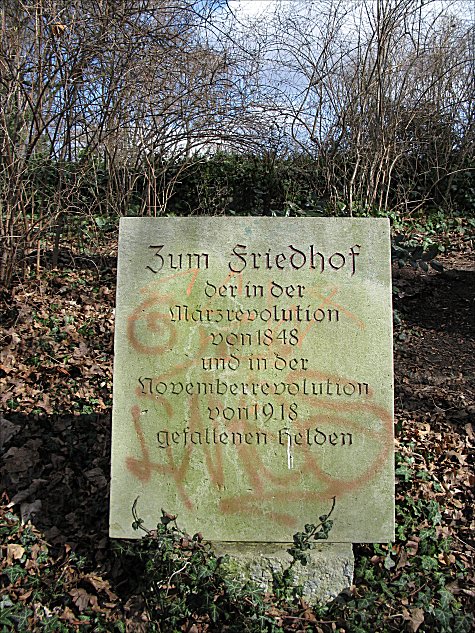
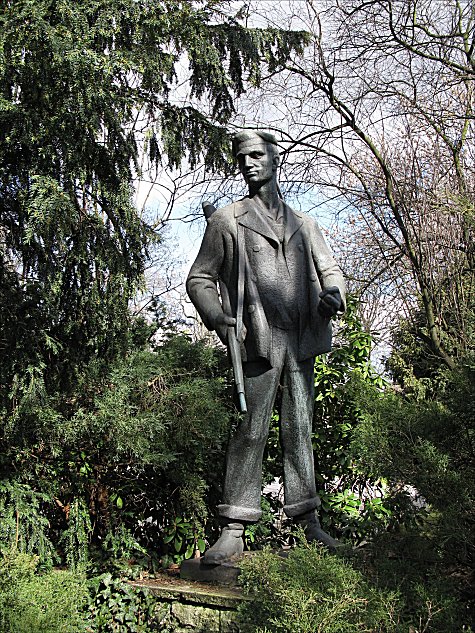
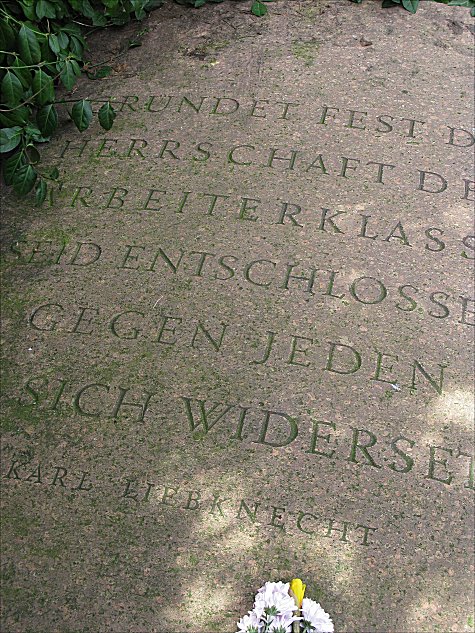
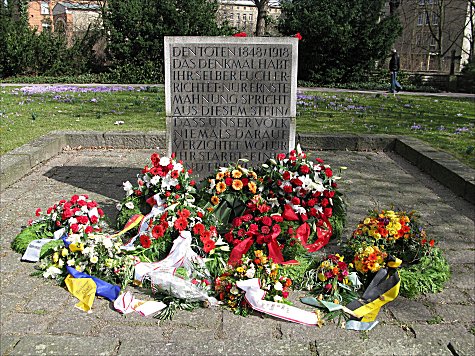
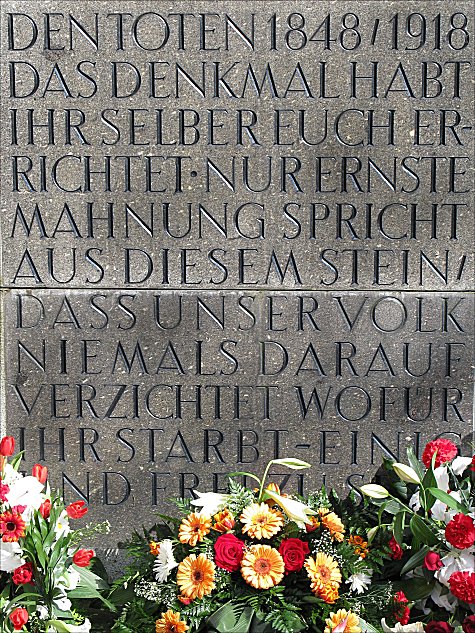
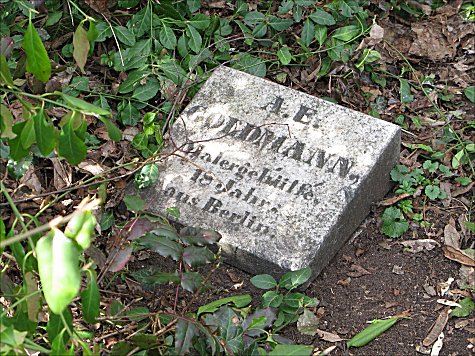
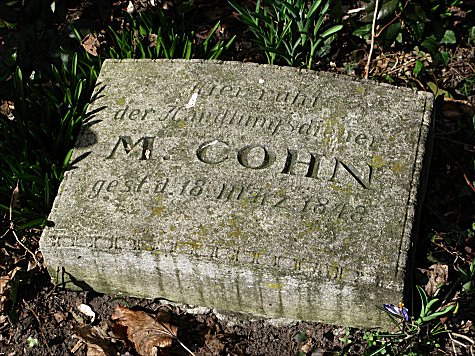
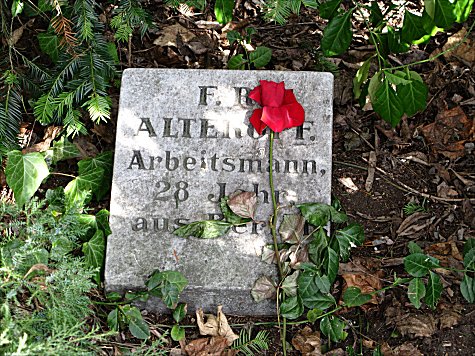
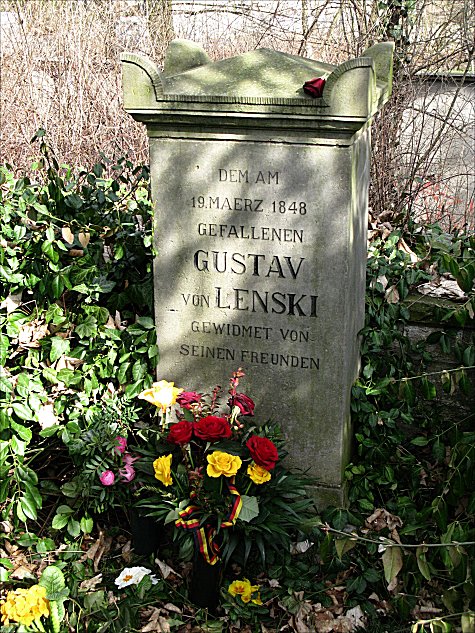
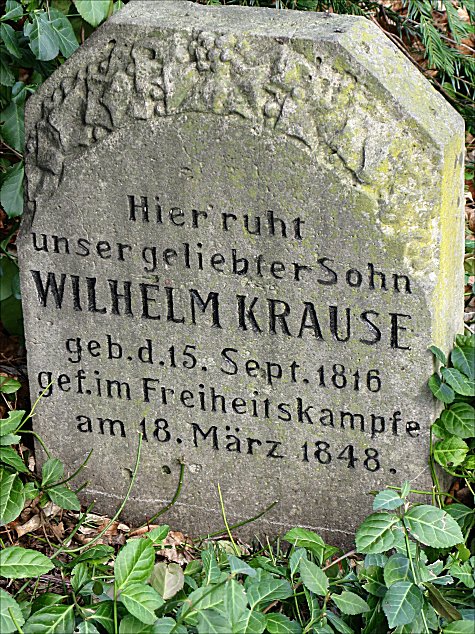
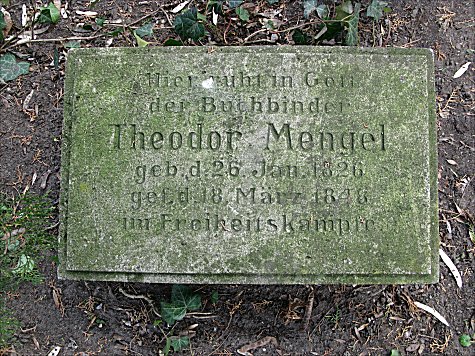
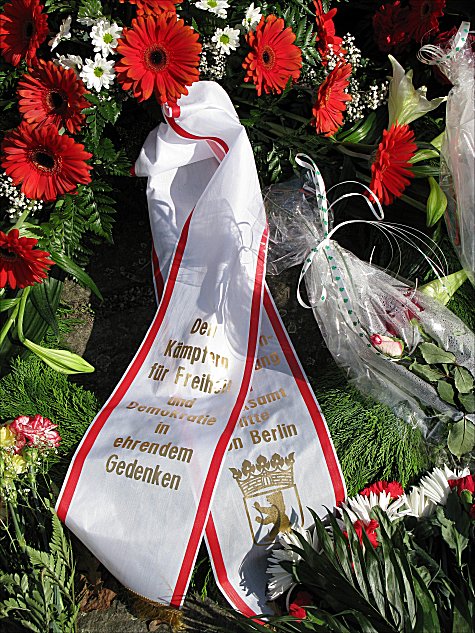
Nachrichten aus Berlin: Friedhof der Märzgefallenen Berlin
1848 gilt als Geburtsjahr der bürgerlichen Demokratie in Deutschland. Am 18 März wurde von Berliner Bürger hunderte von Barrikaden im Stadtgebiet errichtet, um zu demonstrieren für demokratische Rechte. Arbeiter und Bürger besiegten im Straßen- und Barrikadenkampf die Truppen des Preusischen Königs. Rund 250 Menschen verloren ihr Leben. An einem quasi unbekannten Ort, in Volkspark Friedrichshain, gibts dem vernachlässigte Friedhof der Märzgefallenen. In 1918 wurden 33 Arbeiter und Soldaten beigesetzt, die während der Kämpfe der Novemberrevolution in Berlin gefallen sind. Es gibt pläne um in 2010 die Grabanlage herzurichten und einen Informationspavillon mit einer Ausstellung aufzustellen.
Photos Anton K.
![]()
fleursdumal.nl magazine – magazine for art & literature
März 2009
More in: Galerie des Morts, Nachrichten aus Berlin
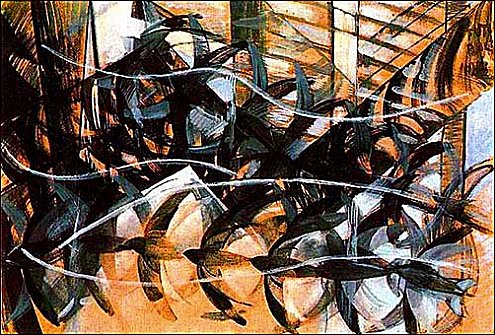
F U T U R I S M O 1 0 0
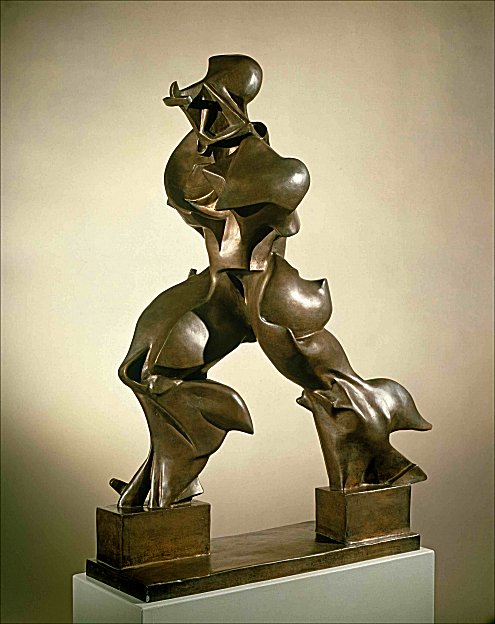
ROVERETO
Futurismo 100: Illuminations
Avant-gardes compared. Italy, Germany, Russia
17 January 2009 to 7 June 2009
One hundred years after the publication of the Futurist manifesto, the innovative force of the highly important art movement launched by Filippo Tommaso Marinetti in 1909 has lost none of its power. The Mart celebrates the centenary of Italy’s leading avant-garde movement by taking a fresh look at it in an exhibition curated by Ester Coen, reconstructing its development within the historical context of the early 20th century.

VENICE
Astrazioni
Museo Correr
5 June to 4 October 2009

MILAN
Simultaneità
Palazzo Reale
15 October 2009 to 25 January 2010
The last of the cycle of art exhibitions concludes the centenary celebrations of Futurism with a tribute to Umberto Boccioni. With Umberto Boccioni as the point of reference, Simultaneita’ compares a sequence of Futurist works by Carlo Carrà and Luigi Russolo to avant-garde European sculpture of the same period, exploring some of the most significant stages of the movement. On display at Simultaneita’ are collections from the Tate in London, Moscow’s Tretyakov Gallery and the Pompidou Centre in Paris, including Alexander Archipenko, Constantin Brancusi, Jean Arp, Raymond Duchamp-Villon, Jacob Epstein, Jacques Lipchitz, Antoine Pevsner, Naum Gabo and Vladimir Tatlin.

ROME
Futurismo
20 February to 24 May 2009
Starting with the early Futurist period, the exhibition offers works from the Centre Pompidou in Paris, and from the Museum of Modern Art in New York, to weave a path around a central core – the reconstruction of the 1912 Futurist exhibition held at the Bernheim-Jeune Gallery in Paris.
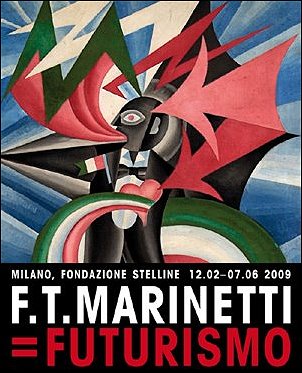
fleursdumal.nl magazine
magazine for art & literature
More in: Futurism
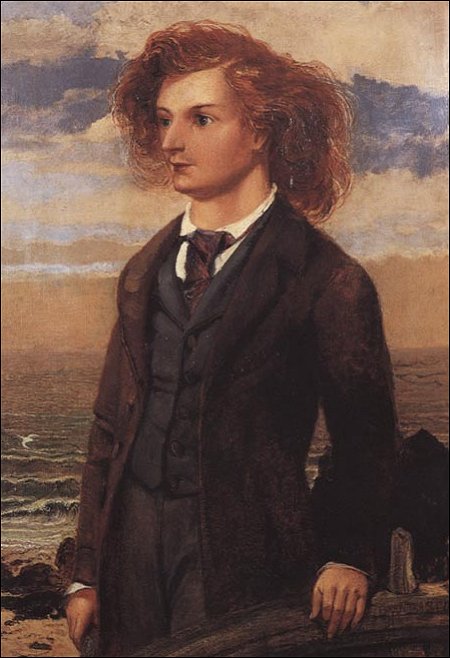
Algernon Charles Swinburne
(1837-1909)
A NEW-YEAR ODE
To Victor Hugo
I
Twice twelve times have the springs of years refilled
Their fountains from the river-head of time
Since by the green sea’s marge, ere autumn chilled
Waters and woods with sense of changing clime,
A great light rose upon my soul, and thrilled
My spirit of sense with sense of spheres in chime,
Sound as of song wherewith a God would build
Towers that no force of conquering war might climb.
Wind shook the glimmering sea
Even as my soul in me
Was stirred with breath of mastery more sublime,
Uplift and borne along
More thunderous tides of song,
Where wave rang back to wave more rapturous rhyme
And world on world flashed lordlier light
Than ever lit the wandering ways of ships by night.
II
The spirit of God, whose breath of life is song,
Moved, though his word was human, on the face
Of those deep waters of the soul, too long
Dumb, dark, and cold, that waited for the grace
Wherewith day kindles heaven: and as some throng
Of quiring wings fills full some lone chill place
With sudden rush of life and joy, more strong
Than death or sorrow or all night’s darkling race,
So was my heart, that heard
All heaven in each deep word,
Filled full with light of thought, and waxed apace
Itself more wide and deep,
To take that gift and keep
And cherish while my days fulfilled their space;
A record wide as earth and sea,
The Legend writ of Ages past and yet to be.
III
As high the chant of Paradise and Hell
Rose, when the soul of Milton gave it wings;
As wide the sweep of Shakespeare’s empire fell,
When life had bared for him her secret springs;
But not his various soul might range and dwell
Amid the mysteries of the founts of things;
Nor Milton’s range of rule so far might swell
Across the kingdoms of forgotten kings.
Men, centuries, nations, time,
Life, death, love, trust, and crime,
Rang record through the change of smitten strings
That felt an exile’s hand
Sound hope for every land
More loud than storm’s cloud-sundering trumpet rings,
And bid strong death for judgment rise,
And life bow down for judgment of his awless eyes.
IV
And death, soul-stricken in his strength, resigned
The keeping of the sepulchres to song;
And life was humbled, and his height of mind
Brought lower than lies a grave-stone fallen along;
And like a ghost and like a God mankind
Rose clad with light and darkness; weak and strong,
Clean and unclean, with eyes afire and blind,
Wounded and whole, fast bound with cord and thong,
Free; fair and foul, sin-stained,
And sinless; crowned and chained;
Fleet-limbed, and halting all his lifetime long;
Glad of deep shame, and sad
For shame’s sake; wise, and mad;
Girt round with love and hate of right and wrong;
Armed and disarmed for sleep and strife;
Proud, and sore fear made havoc of his pride of life.
V
Shadows and shapes of fable and storied sooth
Rose glorious as with gleam of gold unpriced;
Eve, clothed with heavenly nakedness and youth
That matched the morning’s; Cain, self-sacrificed
On crime’s first altar: legends wise as truth,
And truth in legends deep embalmed and spiced;
The stars that saw the starlike eyes of Ruth,
The grave that heard the clarion call of Christ.
And higher than sorrow and mirth
The heavenly song of earth
Sprang, in such notes as might have well sufficed
To still the storms of time
And sin’s contentious clime
With peace renewed of life reparadised:
Earth, scarred not yet with temporal scars;
Goddess of gods, our mother, chosen among the stars.
VI
Earth fair as heaven, ere change and time set odds
Between them, light and darkness know not when,
And fear, grown strong through panic periods,
Crouched, a crowned worm, in faith’s Lernean fen,
And love lay bound, and hope was scourged with rods,
And death cried out from desert and from den,
Seeing all the heaven above him dark with gods
And all the world about him marred of men.
Cities that nought might purge
Save the sea’s whelming surge
From all the pent pollutions in their pen
Deep death drank down, and wrought,
With wreck of all things, nought,
That none might live of all their names again,
Nor aught of all whose life is breath
Serve any God whose likeness was not like to death.
VII
Till by the lips and eyes of one live nation
The blind mute world found grace to see and speak,
And light watched rise a more divine creation
At that more godlike utterance of the Greek,
Let there be freedom. Kings whose orient station
Made pale the morn, and all her presage bleak,
Girt each with strengths of all his generation,
Dim tribes of shamefaced soul and sun-swart cheek,
Twice, urged with one desire,
Son following hard on sire,
With all the wrath of all a world to wreak,
And all the rage of night
Afire against the light
Whose weakness makes her strong-winged empire weak,
Stood up to unsay that saying, and fell
Too far for song, though song were thousand-tongued, to tell.
VIII
From those deep echoes of the loud Ægean
That rolled response whereat false fear was chid
By songs of joy sublime and Sophoclean,
Fresh notes reverberate westward rose to bid
All wearier times take comfort from the pæan
That tells the night what deeds the sunrise did,
Even till the lawns and torrents Pyrenean
Ring answer from the records of the Cid.
But never force of fountains
From sunniest hearts of mountains
Wherein the soul of hidden June was hid
Poured forth so pure and strong
Springs of reiterate song,
Loud as the streams his fame was reared amid,
More sweet than flowers they feed, and fair
With grace of lordlier sunshine and more lambent air.
IX
A star more prosperous than the storm-clothed east’s
Clothed all the warm south-west with light like spring’s,
When hands of strong men spread the wolves their feasts
And from snake-spirited princes plucked the stings;
Ere earth, grown all one den of hurtling beasts,
Had for her sunshine and her watersprings
The fire of hell that warmed the hearts of priests,
The wells of blood that slaked the lips of kings.
The shadow of night made stone
Stood populous and alone,
Dense with its dead and loathed of living things
That draw not life from death,
And as with hell’s own breath
And clangour of immitigable wings
Vexed the fair face of Paris, made
Foul in its murderous imminence of sound and shade.
X
And all these things were parcels of the vision
That moved a cloud before his eyes, or stood
A tower half shattered by the strong collision
Of spirit and spirit, of evil gods with good;
A ruinous wall rent through with grim division,
Where time had marked his every monstrous mood
Of scorn and strength and pride and self-derision:
The Tower of Things, that felt upon it brood
Night, and about it cast
The storm of all the past
Now mute and forceless as a fire subdued:
Yet through the rifted years
And centuries veiled with tears
And ages as with very death imbrued
Freedom, whence hope and faith grow strong,
Smiles, and firm love sustains the indissoluble song.
XI
Above the cloudy coil of days deceased,
Its might of flight, with mists and storms beset,
Burns heavenward, as with heart and hope increased,
For all the change of tempests, all the fret
Of frost or fire, keen fraud or force released,
Wherewith the world once wasted knows not yet
If evil or good lit all the darkling east
From the ardent moon of sovereign Mahomet.
Sublime in work and will
The song sublimer still
Salutes him, ere the splendour shrink and set;
Then with imperious eye
And wing that sounds the sky
Soars and sees risen as ghosts in concourse met
The old world’s seven elder wonders, firm
As dust and fixed as shadows, weaker than the worm.
XII
High witness borne of knights high-souled and hoary
Before death’s face and empire’s rings and glows
Even from the dust their life poured forth left gory,
As the eagle’s cry rings after from the snows
Supreme rebuke of shame clothed round with glory
And hosts whose track the false crowned eagle shows;
More loud than sounds through stormiest song and story
The laugh of slayers whose names the sea-wind knows;
More loud than peals on land
In many a red wet hand
The clash of gold and cymbals as they close;
Loud as the blast that meets
The might of marshalled fleets
And sheds it into shipwreck, like a rose
Blown from a child’s light grasp in sign
That earth’s high lords are lords not over breeze and brine.
XIII
Above the dust and mire of man’s dejection
The wide-winged spirit of song resurgent sees
His wingless and long-labouring resurrection
Up the arduous heaven, by sore and strange degrees
Mount, and with splendour of the soul’s reflection
Strike heaven’s dark sovereign down upon his knees,
Pale in the light of orient insurrection,
And dumb before the almightier lord’s decrees
Who bade him be of yore,
Who bids him be no more:
And all earth’s heart is quickened as the sea’s,
Even as when sunrise burns
The very sea’s heart yearns
That heard not on the midnight-walking breeze
The wail that woke with evensong
From hearts of poor folk watching all the darkness long.
XIV
Dawn and the beams of sunbright song illume
Love, with strange children at her piteous breast,
By grace of weakness from the grave-mouthed gloom
Plucked, and by mercy lulled to living rest,
Soft as the nursling’s nigh the grandsire’s tomb
That fell on sleep, a bird of rifled nest;
Soft as the lips whose smile unsaid the doom
That gave their sire to violent death’s arrest.
Even for such love’s sake strong,
Wrath fires the inveterate song
That bids hell gape for one whose bland mouth blest
All slayers and liars that sighed
Prayer as they slew and lied
Till blood had clothed his priesthood as a vest,
And hears, though darkness yet be dumb,
The silence of the trumpet of the wrath to come.
XV
Nor lacked these lights of constellated age
A star among them fed with life more dire,
Lit with his bloodied fame, whose withering rage
Made earth for heaven’s sake one funereal pyre
And life in faith’s name one appointed stage
For death to purge the souls of men with fire.
Heaven, earth, and hell on one thrice tragic page
Mixed all their light and darkness: one man’s lyre
Gave all their echoes voice;
Bade rose-cheeked love rejoice,
And cold-lipped craft with ravenous fear conspire,
And fire-eyed faith smite hope
Dead, seeing enthroned as Pope
And crowned of heaven on earth at hell’s desire
Sin, called by death’s incestuous name
Borgia: the world that heard it flushed and quailed with shame.
XVI
Another year, and hope triumphant heard
The consummating sound of song that spake
Conclusion to the multitudinous word
Whose expectation held her spirit awake
Till full delight for twice twelve years deferred
Bade all souls entering eat and drink, and take
A third time comfort given them, that the third
Might heap the measure up of twain, and make
The sinking year sublime
Among all sons of time
And fan in all men’s memories for his sake.
Each thought of ours became
Fire, kindling from his flame,
And music widening in his wide song’s wake.
Yea, and the world bore witness here
How great a light was risen upon this darkening year.
XVII
It was the dawn of winter: sword in sheath,
Change, veiled and mild, came down the gradual air
With cold slow smiles that hid the doom beneath.
Five days to die in yet were autumn’s, ere
The last leaf withered from his flowerless wreath.
South, east, and north, our skies were all blown bare,
But westward over glimmering holt and heath
Cloud, wind, and light had made a heaven more fair
Than ever dream or truth
Showed earth in time’s keen youth
When men with angels communed unaware.
Above the sun’s head, now
Veiled even to the ardent brow,
Rose two sheer wings of sundering cloud, that were
As a bird’s poised for vehement flight,
Full-fledged with plumes of tawny fire and hoar grey light.
XVIII
As midnight black, as twilight brown, they spread,
But feathered thick with flame that streaked and lined
Their living darkness, ominous else of dread,
From south to northmost verge of heaven inclined
Most like some giant angel’s, whose bent head
Bowed earthward, as with message for mankind
Of doom or benediction to be shed
From passage of his presence. Far behind,
Even while they seemed to close,
Stoop, and take flight, arose
Above them, higher than heavenliest thought may find
In light or night supreme
Of vision or of dream,
Immeasurable of men’s eyes or mounting mind,
Heaven, manifest in manifold
Light of pure pallid amber, cheered with fire of gold.
XIX
And where the fine gold faded all the sky
Shone green as the outer sea when April glows,
Inlaid with flakes and feathers fledged to fly
Of cloud suspense in rapture and repose,
With large live petals, broad as love bids lie
Full open when the sun salutes the rose,
And small rent sprays wherewith the heavens most high
Were strewn as autumn strews the garden-close
With ruinous roseleaves whirled
About their wan chill world,
Through wind-worn bowers that now no music knows,
Spoil of the dim dusk year
Whose utter night is near,
And near the flower of dawn beyond it blows;
Till east and west were fire and light,
As though the dawn to come had flushed the coming night.
XX
The highways paced of men that toil or play,
The byways known of none but lonely feet,
Were paven of purple woven of night and day
With hands that met as hands of friends might meet–
As though night’s were not lifted up to slay
And day’s had waxed not weaker. Peace more sweet
Than music, light more soft than shadow, lay
On downs and moorlands wan with day’s defeat,
That watched afar above
Life’s very rose of love
Let all its lustrous leaves fall, fade, and fleet,
And fill all heaven and earth
Full as with fires of birth
Whence time should feed his years with light and heat:
Nay, not life’s, but a flower more strong
Than life or time or death, love’s very rose of song.
XXI
Song visible, whence all men’s eyes were lit
With love and loving wonder: song that glowed
Through cloud and change on souls that knew not it
And hearts that wist not whence their comfort flowed,
Whence fear was lightened of her fever-fit,
Whence anguish of her life-compelling load.
Yea, no man’s head whereon the fire alit,
Of all that passed along that sunset road
Westward, no brow so drear,
No eye so dull of cheer,
No face so mean whereon that light abode,
But as with alien pride
Strange godhead glorified
Each feature flushed from heaven with fire that showed
The likeness of its own life wrought
By strong transfiguration as of living thought.
XXII
Nor only clouds of the everlasting sky,
Nor only men that paced that sunward way
To the utter bourne of evening, passed not by
Unblest or unillumined: none might say,
Of all things visible in the wide world’s eye,
That all too low for all that grace it lay:
The lowliest lakelets of the moorland nigh,
The narrowest pools where shallowest wavelets play,
Were filled from heaven above
With light like fire of love,
With flames and colours like a dawn in May,
As hearts that lowlier live
With light of thoughts that give
Light from the depth of souls more deep than they
Through song’s or story’s kindling scroll,
The splendour of the shadow that reveals the soul.
XXIII
For, when such light is in the world, we share,
All of us, all the rays thereof that shine:
Its presence is alive in the unseen air,
Its fire within our veins as quickening wine;
A spirit is shed on all men everywhere,
Known or not known of all men for divine.
Yea, as the sun makes heaven, that light makes fair
All souls of ours, all lesser souls than thine,
Priest, prophet, seer and sage,
Lord of a subject age
That bears thy seal upon it for a sign;
Whose name shall be thy name,
Whose light thy light of fame,
The light of love that makes thy soul a shrine;
Whose record through all years to be
Shall bear this witness written–that its womb bare thee.
XXIV
O mystery, whence to one man’s hand was given
Power upon all things of the spirit, and might
Whereby the veil of all the years was riven
And naked stood the secret soul of night!
O marvel, hailed of eyes whence cloud is driven,
That shows at last wrong reconciled with right
By death divine of evil and sin forgiven!
O light of song, whose fire is perfect light!
No speech, no voice, no thought,
No love, avails us aught
For service of thanksgiving in his sight
Who hath given us all for ever
Such gifts that man gave never
So many and great since first Time’s wings took flight.
Man may not praise a spirit above
Man’s: life and death shall praise him: we can only love.
XXV
Life, everlasting while the worlds endure,
Death, self-abased before a power more high,
Shall bear one witness, and their word stand sure,
That not till time be dead shall this man die
Love, like a bird, comes loyal to his lure;
Fame flies before him, wingless else to fly.
A child’s heart toward his kind is not more pure,
An eagle’s toward the sun no lordlier eye.
Awe sweet as love and proud
As fame, though hushed and bowed,
Yearns toward him silent as his face goes by:
All crowns before his crown
Triumphantly bow down,
For pride that one more great than all draws nigh:
All souls applaud, all hearts acclaim,
One heart benign, one soul supreme, one conquering name.
.jpg)
Algernon Charles Swinburne: A New-Year Ode to Victor Hugo
fleursdumal.nl magazine – magazine for art & literature
More in: Swinburne, Algernon Charles, Victor Hugo
![]()
Art Amsterdam 2009
Amsterdam RAI
woensdag 13 t|m 17 mei 2009
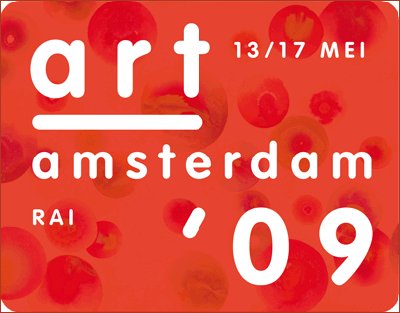
Art Amsterdam viert 25-jarig bestaan met 120 solo’s
Op de 25e jubileumeditie van Art Amsterdam tonen ruim 120 galerieën de laatste trends in de hedendaagse kunst met schilderijen, foto’s, beelden, installaties en video’s. Onder de deelnemende galerieën is de complete top van de Nederlandse galeriewereld, naast 32 buitenlandse galerieën uit tien landen: Duitsland, Engeland, België, Frankrijk, Denemarken, Oostenrijk, Verenigde Staten, Japan, Zuid-Afrika en Zuid-Korea. Al deze galerieën brengen een solotentoonstelling. Dat zijn in totaal 120 solopresentaties met werk van één kunstenaar: uniek op een hedendaags kunstevenement. Zo viert Art Amsterdam haar 25-jarig bestaan, met een feestelijke opening door Hare Majesteit de Koningin op woensdag 13 mei.
Opvallend is ook ‘Off the record’, een foto-expositie van Stedelijk Museum Amsterdam met gastcurator Hans Aarsman. Verder fotografeert Cees Krijnen bij de entree vrouwelijke bezoekers voor zijn project ‘Cees’ kunstminnende bewuste vrouwen collectief’, waarvan hij terplekke een fototentoonstelling formeert. De meest veelbelovende jonge kunstenaar ontvangt de prestigieuze Thieme Art Award; het werk van de vijf genomineerde jonge talenten is te zien op de beurs. Ook zijn er dagelijks drie gratis rondleidingen langs alle hoogtepunten van Art Amsterdam. Kunstliefhebbers-, kijkers en kopers zijn van woensdag 13 tot en met zondag 17 mei 2009 van harte welkom in Hal 8/Parkhal van Amsterdam RAI.
‘State of the art’ in hedendaagse kunst met 120 solo’s
Directeur Anneke Oele van Art Amsterdam: “Voor deze 25e editie heb ik gekozen voor dit unieke solo-concept, waarbij alle 120 galerieën op minstens 25 vierkante meter van hun stand het werk van één kunstenaar brengen. Solopresentaties geven de bezoeker namelijk een goed, breed beeld van het werk van één kunstenaar en brengen tegelijk spanning en rust op de beursvloer. Een rondgang langs alle solo’s geeft de bezoeker een overzicht van de laatste stand van zaken in de hedendaagse kunst: van gevestigde kunstenaars als Armando (Galerie Willy Schoots), Jeroen Henneman (PARC- Editions), Marc Mulders (CS Edtions) en Lucassen (Galerie Nouvelles Images) tot jonge, internationaal opererende kunstenaars als Kiki Lamers (Annet Gelink Gallery), Mounir Fatmi (Galerie Ferdinand van Dieten) en Andy Holden (bij Hidde van Seggelen), maar ook Aziatische, jonge kunstenaars als de Japanse Takashi Suzuki (Gallery Terashita) en de Koreaanse Kyunwoo Chun (Van Zoetendaal). Dit resulteert in een prachtig evenement met 120 solo’s, dat is uniek in de kunstwereld.”
‘Off the Record’ van Stedelijk Museum Amsterdam
Centraal op de beursvloer is de expositie ‘Off the record’ van Stedelijk Museum Amsterdam, met de presentatie van de Gemeentelijke Kunstaankopen 2009 – Fotografie. Gastcurator Hans Aarsman nodigde voor ‘Off the record’ kunstenaars uit werk in te zenden dat gemaakt is vanuit de behoefte om iets vast te leggen, zonder direct een artistiek doel voor ogen. Een jury, onder voorzitterschap Aarsman, selecteerde de deelnemende kunstenaars uit meer dan 470 inzendingen. De geselecteerde werken (fotografie en video) worden getoond in de centrale tentoonstelling op Art Amsterdam. Op vrijdag 15 mei maakt directeur Gijs van Tuyl bekend welke werken worden aangekocht voor de collectie van het Stedelijk Museum. Bij de tentoonstelling verschijnt een publicatie met een essay van Aarsman. De tentoonstelling wordt mede mogelijk gemaakt door Accenture, partner van Art Amsterdam, en met financiële ondersteuning van de Gemeente Amsterdam.
fleursdumal.nl magazine for art & literature
More in: Exhibition Archive, Marc Mulders
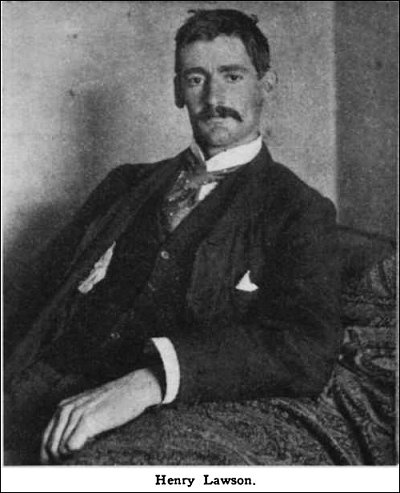
H e n r y L a w s o n
(1867-1922)
The Unknown God
A Phantasy of Optimism
The President to Kingdoms,
As in the Days of Old;
The King to the Republic,
As it had been foretold.
They could not read the spelling,
They would not hear the call;
They would not brook the telling
Of Writing on the Wall.
I buy my Peace with Slaughter,
With Peace I fashion War;
I drown the land with water,
With land I build the shore.
I walk with Son and Daughter
Where Ocean rolled before.
I build a town where sea was
A tower where tempests roar.
From bays in distant islands,
And rocks in lonely seas,
With unseen Death in silence
I smite mine enemies!
The great Cathedral crashes
Where once a city stood;
I build again on ashes
And breed on clotted blood!
I link the seas together,
And at my sign and will
The train runs on the ocean bed,
The great ship climbs the hill!
For pastime I flood deserts
With water from the rill;
And in my tireless leisure hours
I empty lakes, and fill.
I plumb the seas beneath us
And fathom skies above,
Yet I make Peace for hatred
And I make War for love.
I race beneath the ranges
And sit where Mystery dwells–
Yet mankind sees no changes,
They ask for “miracles!”
I own the world and span its
Lone lands from Pole to Pole;
I live in other planets,
Yet do not know my soul–
The soul that none may fathom,
Whose secrets none may tell,
The soul that none may humble,
The Soul Unconquerable!
I am the God of Ages!
I am the Unknown God!
My life is written pages
Wherever man hath trod.
From bounds of Polar regions,
To where the Desert reigns,
I’ve left my myriad legions
On countless vanished plains.
And I shall reign for ever
On earth while oceans roll,
In shape of man, or woman,
Through my immortal soul;
Yet I can love and suffer,
Be angry, or be mild,
And I can bow me down and weep
Just like a mortal child.
I conquer Death and Living,
And Fiends in shape of men,
For I rejoice in giving
Not to receive again.
For I am Man!–and Mortal!
And Mammon’s Towers must fall,
Though Greed draws all his pencils through
The Writing on the Wall!

Henry Lawson: The Unknow God
fleursdumal.nl magazine
More in: Archive K-L, Lawson, Henry
.jpg)
Ed Schilders over Cees Buddingh’
B L A U W B I L G O R G E L
Zijn vader was een porgel. Zijn moeder was een porulan. Als hij niet wokt of worgelt, dan ligt hij languit in de zon, en knoestert hij zijn knezidon. Hij lust alleen maar korgel. Behalve als de nachtuil krijst, dan eet hij riep en rimmelrijst. Hij is de oervader van de Nederlandse fabeldieren, en de eerste regel van zijn gedicht behoort volgens website allesopeenrij.nl tot de twintig bekendste dichtregels: ‘Ik ben de blauwbilgorgel.’ C. Buddingh’ (1918-1985) schreef dit vers en drie andere gorgelrijmen (De bozbezbozzel, De vogel Kraps, en De gringergoriaan) in de eerste maanden van 1943 tijdens zijn verblijf in een sanatorium, waar hij herstelde van tuberculose. En dus wordt de blauwbilgorgel dit jaar 65, een kroonjaar dat met name in Dordrecht, de stad waar Buddingh’ woonde en werkte, gevierd wordt. Maar ook in 2009 kan er reden tot gedenken zijn, want in 1944 verschenen die eerste vier gorgelrijmen voor het eerst in druk, clandestien, bij de Bezige Bij. Net als Kees Stips ‘Dieuwertje Diekema’ werden ze in de laatste oorlogsjaren zeer populair: gestencild, overgeschreven, uit het hoofd geleerd. En de troeteldieren van de Nederlandse poëzie zijn ze altijd gebleven.
Sindsdien heeft Buddingh’ de familie der gorgeldieren een rijk nageslacht bezorgd. Wim Huijser en Peter de Roos tellen in Raban! Raban! Raban! 79 soorten en ondersoorten (inclusief drie ongepubliceerde), en vertellen het levensverhaal van de jubilaris en zijn soortgenoten. Hun ontstaansgeschiedenis en hun plaats in de biografie van de dichter, hun rol als wegbereiders voor het nonsensvers binnen de moderne poëzie, en hoe ze beeldend kunstenaars en componisten geïnspireerd hebben. De Dordtse uitgeverij Liverse, bekend als uitgever van light verse, vroeg zesentwintig dichters een gorgelrijm te schrijven in navolging van Buddingh’. Dat leverde de bundel De Blauwbilgorgel 65 jaar!! op, een prachtig geïllustreerde hommage. Sommige dichters creëerden inderdaad een nieuw gorgeldier, zoals Cornelis Putemmer met ‘De Schavelpozem’: Een schavelpozem is precies/ Een strut, maar heeft een holle kies/ Zijn lange oren hangen los/ Net als bij een snorkelvos. Anderen begeven zich niet meer in de natuurlijke historie van het fabeldier, en maken er een stijloefening van. Ingmar Heytze bijvoorbeeld en zijn ‘Grammelalmanak’: Mijn zolder heeft een muffe hoek/ waar strint en gruifdier woekeren./ Daar ligt mijn grammelalmanak./ Ik mag er graag in koekeren.
Dankzij de bijdrage van Jehanne Hulsman weten we nu ook wat meer over de ouders van de blauwbilgorgel, vader porgel en moeder porulan. De derde strofe van ‘De ouders’ gaat zo: De Porgel lang en zacht behaard,/ verraste haar met zijn verpaard./ Zeer weerloos was zij voor zijn dreef,/ de letters die hij puntloos schreef./ Faleef, Faleef, Faleef!

Op het literair-historische ouderschap van ‘blauwbilgorgel’ doen Huijser en De Roos ondertussen geen nieuw licht schijnen. In interviews vertelde Buddingh’ steeds weer dat hij, toen hij in het sanatorium lag, van een vriendin een fragment kreeg toegestuurd uit een boek van de Engelse schrijfster Edith Nesbit. Daarin kwam het woord ‘bluebillgurgle’ voor, en dat ‘vertaalde’ Buddingh’ letterlijk: de blauwbilgorgel was geboren. ‘Ik heb het (Engelse) woord nooit in een woordenboek kunnen vinden’, zei Buddingh’ in een interview met Simon Vinkenoog. Het lijkt me niet uitgesloten dat het een samenstelling is van ‘bluebill’ en ‘gurgle’, een eendensoort met een blauwe bek, en het gorgelende of snaterende geluid. Het is tot nu toe niet ontdekt in welk boek van Nesbit ‘bluebillgurgle’ voorkomt. Ze schreef, las ik in een biografie op internet, vierenveertig romans en jeugdboeken, dus ik zou zeggen dat er werk aan de winkel is voor het Buddingh’ Genootschap. De status van Edith Nesbit (1858-1924) blijft bij Huijser en De Roos (die haar abusievelijk Nesbitt noemen) onderbelicht. Terwijl het toch om, zeg maar, de draagmoeder van de blauwbilgorgel gaat. Nesbits The Railway Children is een klassieker die nog steeds in druk is. Zeven van haar boeken vond ik terug in Manguel en Guadalupi’s Dictionary of Imaginary Places.
Als de ‘bluebillgurgle’ bestaat als missing link, dan denk ik dat hij dáár gezocht moet worden, op een van die fabelachtige plaatsen.
Raban! Raban! Raban!
Wim Huijser en Peter de Roos
Aspekt; 192 pagina’s; EURO 17,95
ISBN 978 90 5911 581 1
De Blauwbilgorgel 65 jaar!!
Uitgeverij Liverse; 60 pagina’s; EURO 17,50
ISBN 978 90 76982 46 5
Eerder gepubliceerd in de boekenbijlage CICERO van De Volkskrant
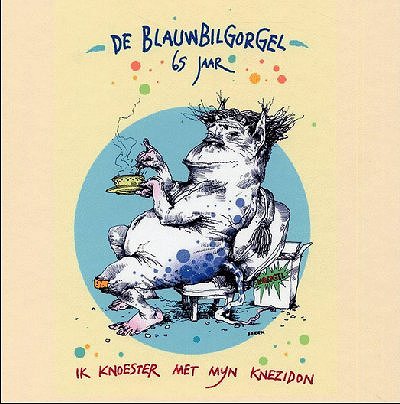
fleursdumal.nl magazine
More in: Buddingh', Cees, Ed Schilders, LIGHT VERSE
.jpg)
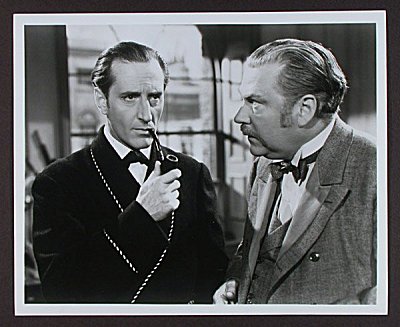

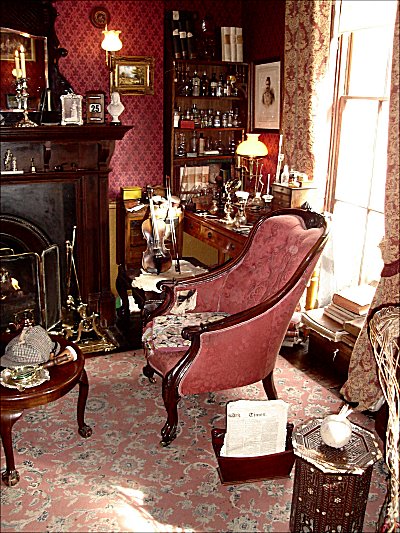

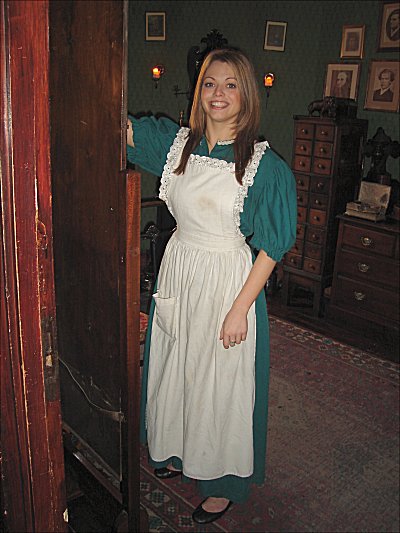
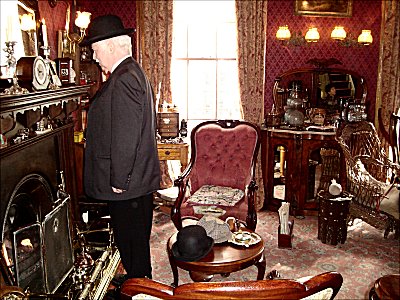
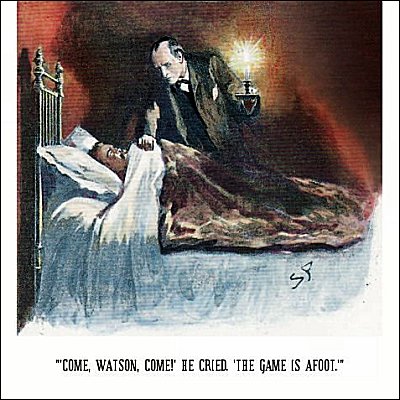
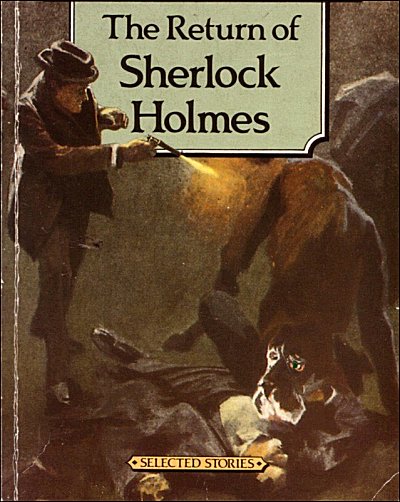

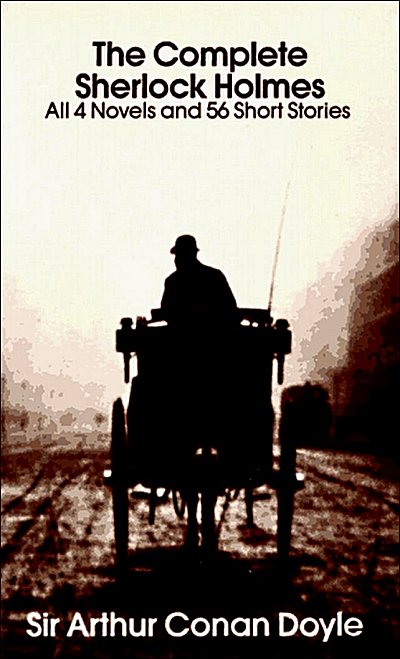
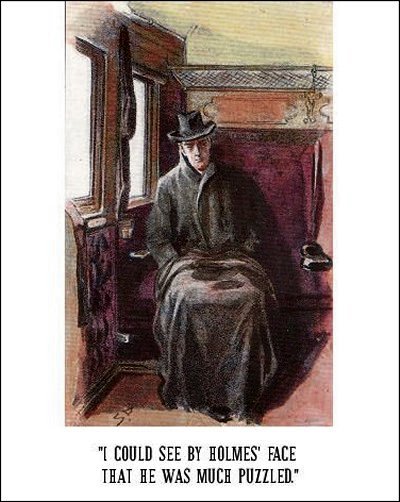
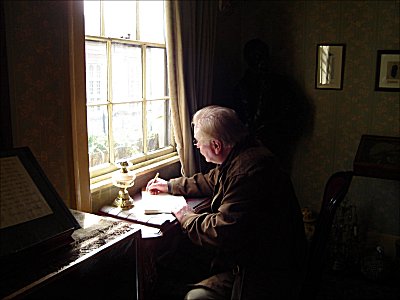
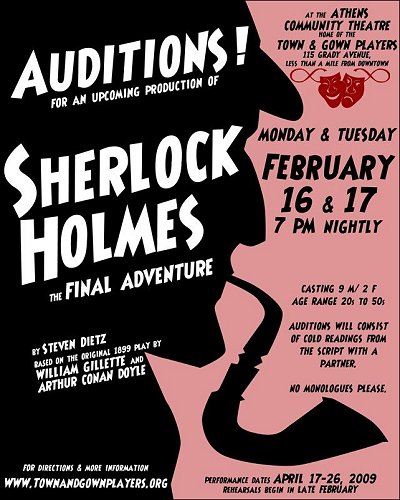

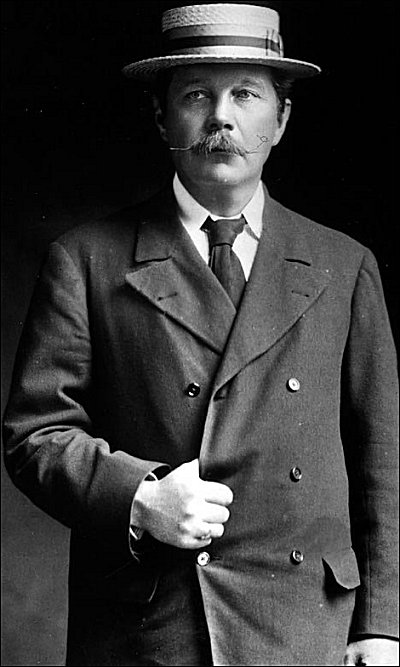
.jpg)
Museum of Literary Treasures
SHERLOCK HOLMES part VI
The Sherlock Holmes Museum
Bakerstreet – LONDON
.jpg)
photos: jefvankempen
Illustrations: Sidney Paget
FLEURSDUMAL.NL MAGAZINE
More in: Arthur Conan Doyle, Illustrators, Illustration, Museum of Literary Treasures, Sherlock Holmes Theatre
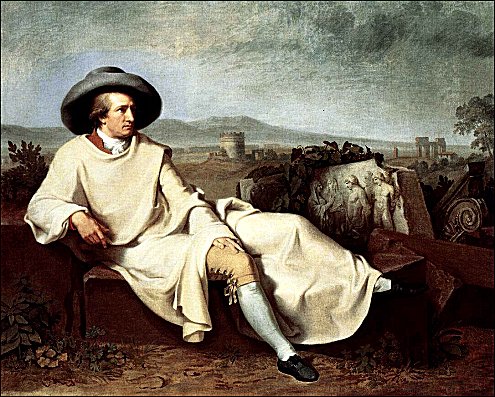
Johann Wolfgang von Goethe
(1749 – 1832)
M a i l i e d
Wie herrlich leuchtet
Mir die Natur!
Wie glänzt die Sonne!
Wie lacht die Flur!
Es dringen Blüten
Aus jedem Zweig
Und tausend Stimmen
Aus dem Gesträuch
Und Freud’ und Wonne
Aus jeder Brust.
O Erd’, o Sonne!
O Glück, o Lust!
O Lieb’, o Liebe!
So golden schön,
Wie Morgenwolken
Auf jenen Höhn!
Du segnest herrlich
Das frische Feld,
Im Blütendampfe
Die volle Welt.
O Mädchen, Mädchen,
Wie lieb’ ich dich!
Wie blickt dein Auge!
Wie liebst du mich!
So liebt die Lerche
Gesang und Luft,
Und Morgenblumen
Den Himmelsduft,
Wie ich dich liebe
Mit warmem Blut,
Die du mir Jugend
Und Freud’ und Mut
Zu neuen Liedern
Und Tänzen gibst.
Sei ewig glücklich,
Wie du mich liebst!
KEMP=MAG poetry magazine
More in: Archive G-H, Goethe, Johann Wolfgang von
.jpg)
100 Gedichte aus der DDR
Herausgegeben und mit einem Nachwort von Christoph Buchwald und Klaus Wagenbach
Ein Blick zurück auf die DDR: Die einzige Anthologie ihrer schönsten und charakteristischen, ihrer vergessenen, geförderten und verbotenen Gedichte.
Ist es nicht merkwürdig, dass die DDR mit ihrem zynisch aufgepäppelten, dann wieder gegängelten Literatursystem viel Namhafteres hervorgebracht hat als die große Freiheit nach der Stasi?« So fragt die FAZ im Jahr 2008. Gegenfrage: Wie gehen wir als Erben mit der DDR- Literatur um, die doch selbst das »kulturelle Erbe« so hoch gehalten hat, dass man es manchmal schon nicht mehr erkennen konnte? Das gilt besonders für die Lyrik der DDR. Christoph Buchwald ( jüngerer Herausgeber des Jahrbuch für Lyrik) und Klaus Wagenbach (älterer Tintenfisch) machen die Probe aufs Exempel und haben 100 Gedichte ausgewählt, angefangen mit antifaschistischen Gedichten (nach dem staatstragenden Leitspruch »Der Antifaschismus ist unser, die BRD hat ihn uns überlassen. «) und endend mit den letzten Gedichten der achtziger Jahre (nach dem Motto »Wie komme ich hier raus?« oder »Was geschieht mit dem Volkseigentum, wenn das Volk wegläuft?
Verlag Klaus Wagenbach Berlin
2009 – 160 Seiten
EUR 16.90
ISBN 978-3-8031-3222-2
fleursdumal.nl magazine – magazine for art & literature
More in: Galerie Deutschland, Literary Events
.jpg)
![]()
DE BARDEN EN HUN KLASSIEKEN
![]()
door Lauran Toorians
Dat de Welse barden in de middeleeuwen en de vroegmoderne tijd, net als hun Ierse en Schotse collega’s, een gedegen opleiding kregen, is algemeen bekend. Met name uit Ierland en Schotland zijn enkele beschrijvingen van de bardische training in de late zeventiende en de achttiende eeuw erg bekend geworden. Dat de poëzie van vroegere voorgangers en de tradities over de vroege middeleeuwen in die opleiding een belangrijke rol speelden, is overduidelijk. Verwijzingen naar helden en vorsten uit het zogenaamde Oude Noorden – de Britse vorstendommen in het huidige grensgebied van Engeland en Schotland – zijn legio en vaak behoorlijk stereotiep.
Tristis est aula – Stauell (…) ys tywyll
Interessanter is het dan ook om (vrijwel) letterlijke citaten uit ouder werk terug te vinden. Wanneer dat lukt, kunnen we namelijk precies zien welke ‘klassieken’ de dichter kent en hoe hij daarmee omspringt in zijn eigen werk. Een opmerkelijk voorbeeld hiervan vond ik bij de Welse auteur Rhigyfarch (1056-1099), die rond 1094 een treurdicht schreef over Ceredigion (Cardigan), een landstreek die toen juist zware verwoestingen had geleden door de Anglo-Normandiërs. Rhigyfarch was strikt genomen geen bard. Hij was een zoon van de geleerde bisschop Sulien van St Davids en was zelf tijdens zijn werkzame leven verbonden aan de kerk van Llanbadarn Fawr (bij Aberystwyth), die toen een centrum van geleerdheid was en waaraan ook een scriptorium was verbonden. Zijn belangrijkste werk is het Vita Davidis, het ‘Leven van St David’ dat later ook in het Wels werd vertaald. Als omschrijving voor de verlatenheid van het hof van Ceredigion, gebruikt Rhigyfarch in zijn treurdicht de frase tristis est aula (‘somber/triest is de hal’). In de context van zijn gedicht is dat een vrijwel letterlijke vertaling van de al even effectieve regel Stauell gyndylan ys tywyll heno (‘duister is de hal (‘het hof’) van Cynddylan vannacht’) uit de zogenaamde Canu Heledd, een gedichtencyclus die wordt gedateerd in de negende eeuw (maar die ook tiende-eeuws kan zijn). In Canu Heledd (‘het lied/de liederen van Heledd’, een legendarische prinses uit de vroege zevende eeuw) bevindt zich een reeks englynion – compacte, drieregelige strofen (het enkelvoud is englyn) – waarvan de eerste drie beginnen met deze regel. De overige dertien englynion openen met een variatie op deze zelfde regel, wat aan de hele reeks een indrukwekkende soberheid verleent.
L e e s m e e r …..
![]()
Lees de volledige tekst van Lauran Toorians:
De barden en hun klassieken
![]()
Inleidend essay van Lauran Toorians:
De Keltische talen
en hun literaturen
![]()
KEMP=MAG poetry magazine
© Lauran Toorians
More in: CELTIC LITERATURE, Lauran Toorians
Thank you for reading Fleurs du Mal - magazine for art & literature